-
ORIGINAL ARTICLE11-11-2022
Analysis of midwives’ situation and the need to measure their workloads
Revista Brasileira de Enfermagem. 2022;75:e20210920
Abstract
ORIGINAL ARTICLEAnalysis of midwives’ situation and the need to measure their workloads
Revista Brasileira de Enfermagem. 2022;75:e20210920
DOI 10.1590/0034-7167-2021-0920
Views0See moreABSTRACT
Objective:
to analyze midwives’ employment situation of midwives and detect their workload measurement needs.
Methods:
a mixed methodology (quantitative and qualitative), observational, descriptive and cross-sectional study. Two phases were carried out. The first methodological phase consisted of conducting semi-structured individual interviews. The second methodological phase analyzed the Nursing Intervention Classification (NIC) interventions that midwives perform in the labor room during daily practice.
Results:
90.3% of midwives have work overload, since for 80.6% the midwife-pregnant mother ratio is not well established, since the mean execution time of a Nursing Intervention Classification (NIC) intervention is 20 minutes. For this reason, 100% of the sample considers the development of workload measurement tools to be highly useful.
Conclusions:
the need to generate an instrument that considers the diversity of Nursing Intervention Classification (NIC) interventions that develop within the labor room is ratified.
-
ORIGINAL ARTICLE11-10-2022
Nursing care for the Amazon population: knowledge production and human resource development
Revista Brasileira de Enfermagem. 2022;75:e20201084
Abstract
ORIGINAL ARTICLENursing care for the Amazon population: knowledge production and human resource development
Revista Brasileira de Enfermagem. 2022;75:e20201084
DOI 10.1590/0034-7167-2020-1084
Views0See moreABSTRACT
Objectives:
to analyze knowledge production adherence from a master’s course in nursing in the Amazon to care and health demands in the region, with an emphasis on neglected tropical diseases and traditional populations in the Amazon.
Methods:
a descriptive study, with a quantitative approach and documentary basis, analyzing dissertations defended in a Graduate Program in Nursing at the Universidade do Estado do Pará in association with the Universidade Federal do Amazonas, from 2012-2019. A descriptive statistical analysis was performed.
Results:
of the 105 dissertations analyzed, 30 (28.6%) were related to neglected tropical diseases. Of these, 11 (10.5%) dealt with Chagas disease, leishmaniasis, tuberculosis, malaria, and leprosy. Traditional populations in the Amazon participated in only 11 (10.5%) studies.
Conclusions:
knowledge production in a master’s course has adherence to care and health demands in the region; however, it needs to enhance its production to strengthen its identity.
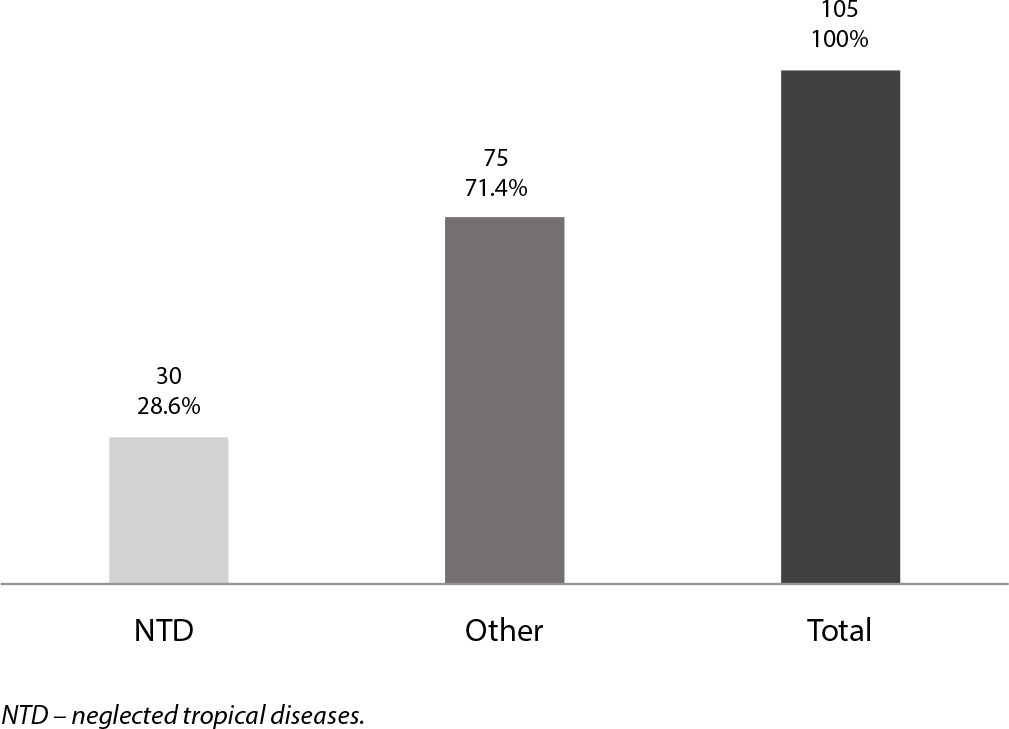
-
ORIGINAL ARTICLE11-10-2022
Content validation to support the monitoring of disclosure of HIV diagnosis in childhood
Revista Brasileira de Enfermagem. 2022;75:e20210027
Abstract
ORIGINAL ARTICLEContent validation to support the monitoring of disclosure of HIV diagnosis in childhood
Revista Brasileira de Enfermagem. 2022;75:e20210027
DOI 10.1590/0034-7167-2021-0027
Views0See moreABSTRACT
Objectives:
to create and validate the content of a guide for monitoring the communication of the HIV diagnosis in childhood.
Methods:
methodological study, with a design guided by the Knowledge-to-Action (KTA) Framework, supported by a participatory approach. The guide’s content was structured according to the communication elements proposed by Lasswel from review studies.
Results:
the content was validated by 26 experts from nursing, medicine, psychology and pedagogy, using a Likert-type scale for relevance, clarity and precision. Data collection took place online and achieved a Content Validity Index of 0.94.
Conclusions:
the guide can contribute to the practice of professionals who care for children living with HIV, to support the family in communication and to the child’s right to know their diagnosis. For further research, it is recommended to create and validate the face of the technology in order to implement it.

-
ORIGINAL ARTICLE11-10-2022
Healthcare: action research with trans people living on the streets
Revista Brasileira de Enfermagem. 2022;75:e20210016
Abstract
ORIGINAL ARTICLEHealthcare: action research with trans people living on the streets
Revista Brasileira de Enfermagem. 2022;75:e20210016
DOI 10.1590/0034-7167-2021-0016
Views0See moreABSTRACT
Objectives:
to analyze the representations of healthcare provided to trans people living on the streets.
Methods:
ten women (three trans) and three cisgender men participated in this action research. Popular health education groups, focus groups, seminars and interviews were held, the data of which were organized in the software Nvivo®, submitted to content analysis and interpreted in the light of intersectionality theory.
Results:
healthcare was represented by the technical, relational, structural and citizenship dimensions. The relationship between gender and poverty determines the specific health needs of trans people living on the streets.
Final Considerations:
the need to expand conceptions and practices on healthcare to meet the specific health needs of trans people living on the streets was evidenced. Nursing, with competence and cultural sensitivity, can contribute to positive health outcomes and, consequently, break with the logic of exclusion, illness and poverty.
-
ORIGINAL ARTICLE11-10-2022
Effect of educational video on newborn care for the knowledge of pregnant and postpartum women and their families
Revista Brasileira de Enfermagem. 2022;75:e20201371
Abstract
ORIGINAL ARTICLEEffect of educational video on newborn care for the knowledge of pregnant and postpartum women and their families
Revista Brasileira de Enfermagem. 2022;75:e20201371
DOI 10.1590/0034-7167-2020-1371
Views0See moreABSTRACT
Objectives:
to evaluate the effect of educational video on newborn care to increase the knowledge of pregnant, postpartum, and family members.
Methods:
a quasi-experimental study, with pre-intervention and post-intervention evaluation with a single group. Fifty-eight pregnant, postpartum, and family members treated in basic health units and a hospital in Ceará, Brazil, participated. The study used the McNemar and binomial tests for the analysis.
Results:
after the intervention, there was an increase in the frequency of hits, from 70.82% to 92.97%. Most of the questions presented a significant increase of hits (p < 0.05) with an emphasis on sleeping position, drying of clothes, free demand for breastfeeding, and things to avoid (such as accessories in the sleeping place and talc in diaper change).
Conclusions:
the educational video was effective to participants in acquiring knowledge on the care of newborns and can assist in health education activities carried out by nurses.
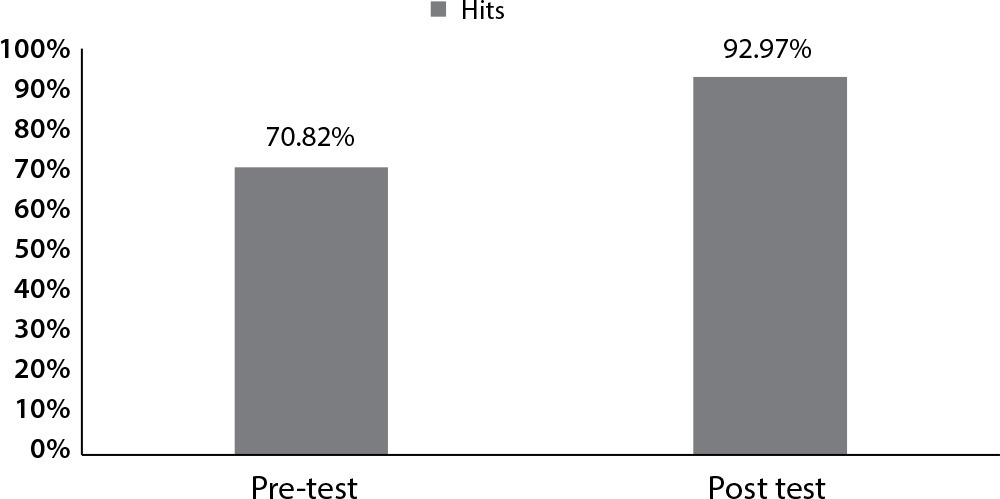
-
ORIGINAL ARTICLE11-10-2022
Home care for children with gastrostomy
Revista Brasileira de Enfermagem. 2022;75:e20200699
Abstract
ORIGINAL ARTICLEHome care for children with gastrostomy
Revista Brasileira de Enfermagem. 2022;75:e20200699
DOI 10.1590/0034-7167-2020-0699
Views0See moreABSTRACT
Objectives:
to describe home care practices performed by family members for maintaining the life of children with gastrostomy.
Methods:
qualitative research using the Sensitive Creative method, with the Criatividade e Sensibilidade Corpo Saber [Corpo Saber Creativity and Sensitivity] dynamics. The participation included ten family caregivers of children with gastrostomy. The outpatient clinic of a federal hospital in Rio de Janeiro was the setting. Lexical analysis was used through the IRaMuTeQ® software.
Results:
Theme 1, entitled “The care for maintaining life performed by family members of children with gastrostomy at home”, was analyzed, comprising three classes: “The gastrostomy tube home care routine”; “The care with the gastrostomy/stoma”; and “Food and medication home care routine of children with gastrostomy”.
Final Considerations:
family caregivers used strategies to maintain the device and acquired new knowledge in this field, and in nursing competence, regarding stoma care, food administration, medication, and syringes.

-
ORIGINAL ARTICLE11-10-2022
Religious/spiritual coping in informal caregivers of children with cleft lip and/or dysphagic palate
Revista Brasileira de Enfermagem. 2022;75:e20201300
Abstract
ORIGINAL ARTICLEReligious/spiritual coping in informal caregivers of children with cleft lip and/or dysphagic palate
Revista Brasileira de Enfermagem. 2022;75:e20201300
DOI 10.1590/0034-7167-2020-1300
Views0See moreABSTRACT
Objectives:
to identify the use of religious/spiritual coping in informal caregivers of children with cleft lip and/or palate, dysphagic, powered exclusively by probe.
Methods:
descriptive and cross-sectional study, including 30 informal caregivers. For data collection, a Sociodemographic Questionnaire and the Brief Religious/Spiritual Coping Scale were used. For statistical analysis, ANOVA, Student’s t and Spearman’s correlation tests were used, with a significance level of 5%.
Results:
the use of religious/spiritual coping was high among participants (mean=3.71), with a predominance of positive (mean=3.30) compared to negative (mean=1.88). It was evident that the greater the reported importance of religiosity/spirituality in the participants’ lives, the greater the positive coping (p=0.001).
Conclusions:
informal caregivers used positive religious/spiritual coping as a way of coping with care demands related to the child’s health condition. These findings point to the importance of including spirituality/religiosity as health indicators.
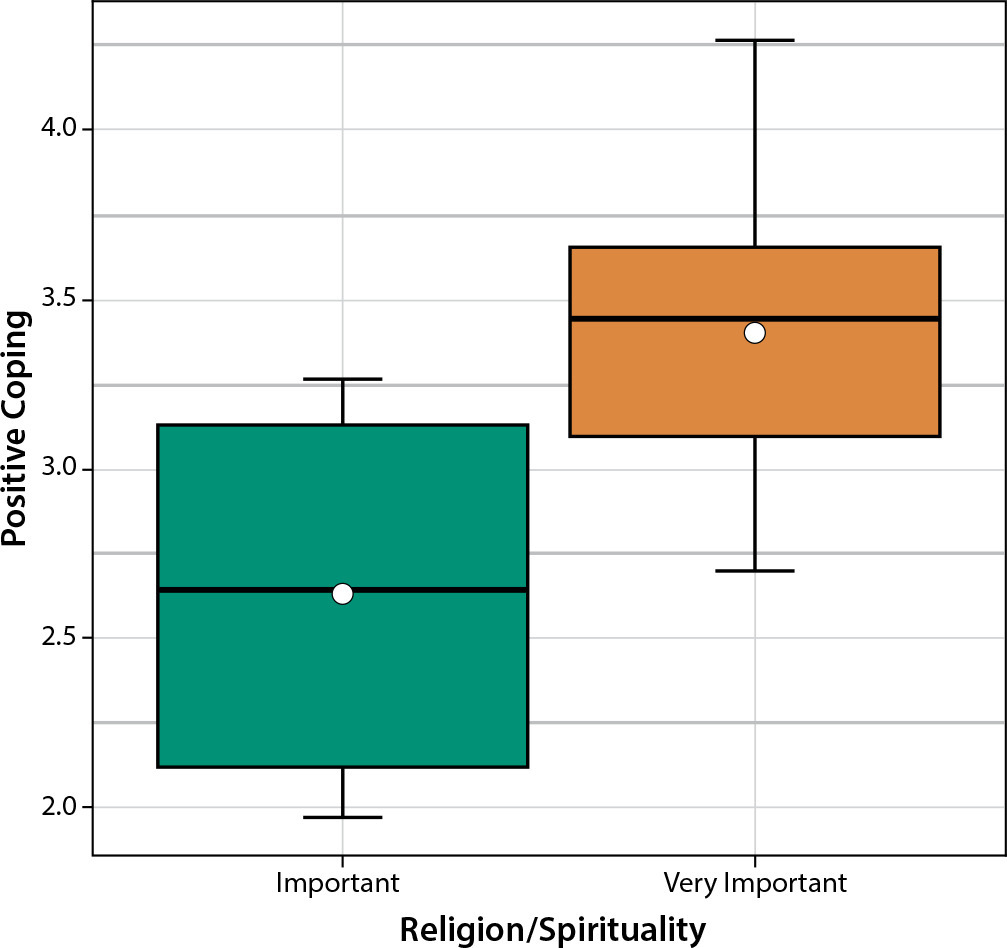
-
ERRATUM11-08-2022
ERRATUM
Revista Brasileira de Enfermagem. 2022;75(1):e2022n1e02
Abstract
ERRATUMERRATUM
Revista Brasileira de Enfermagem. 2022;75(1):e2022n1e02
DOI 10.1590/0034-7167.20227501e02
Views0Article “Hemodialysis in the context of COVID-19: care, nursing protagonism and quality”, with number of DOI: https://doi.org/10.1590/0034-7167-2020-1077, published in the journal Revista Brasileira de Enfermagem, 75(Suppl 1): e20201077, on the front page:Figures 4 and 5 are in reverse order.[…]See more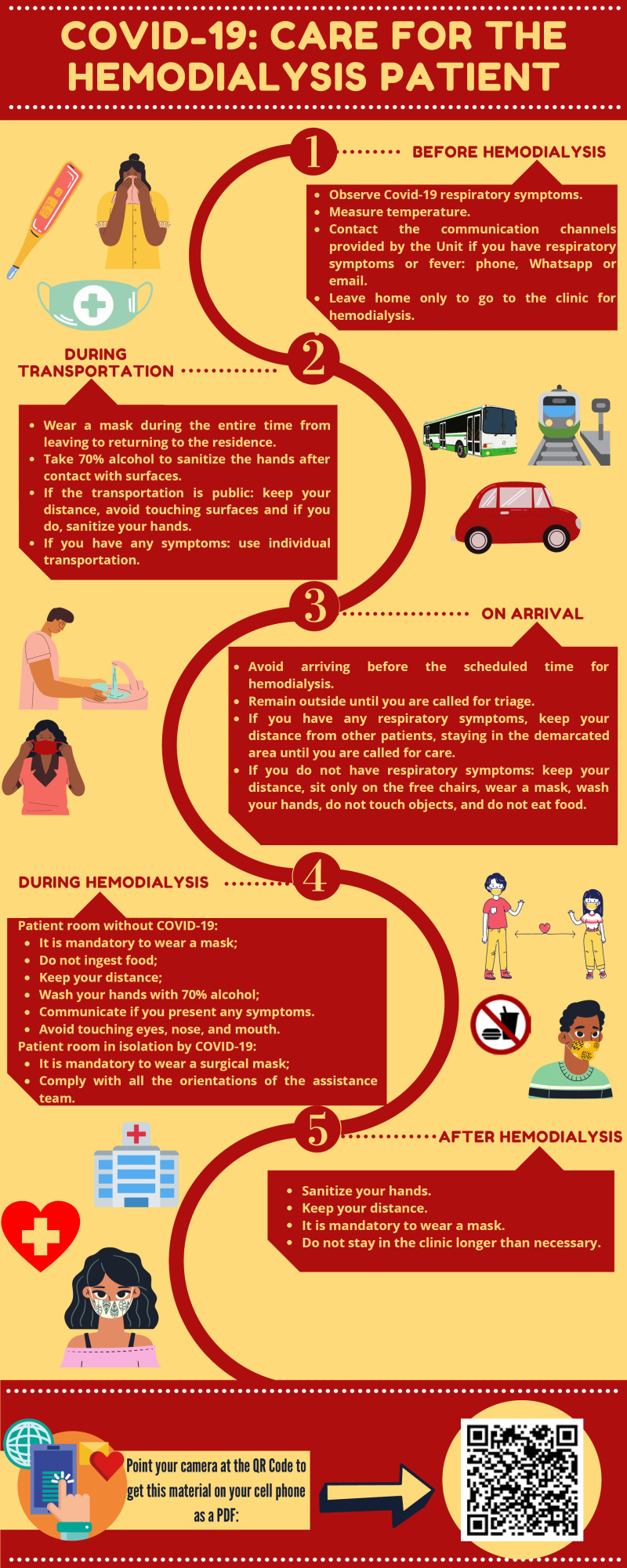
-
EXPERIENCE REPORT01-01-2017
Focus group on qualitative research: experience report
Revista Brasileira de Enfermagem. 2017;70(2):424-429
Abstract
EXPERIENCE REPORTFocus group on qualitative research: experience report
Revista Brasileira de Enfermagem. 2017;70(2):424-429
DOI 10.1590/0034-7167-2016-0091
Views1See moreABSTRACT
Objective:
to report the experience of applying the focus group technique for production of data in qualitative research.
Method:
four group sessions were held from May to June 2015, with the participation of professionals from the public sector of PHC and from specialized service.
Results:
the way focus group was developed is described in steps: planning, recruitment, ambience, group sessions, and evaluation.
Conclusion:
we highlight that the focus group, as a technique to produce data in collective space, can contribute not only to the construction of knowledge in Nursing, but also to the research approach with the assistance practice.

-
RESEARCH01-01-2017
Guide of attributes of the nurse’s political competence: a methodological study
Revista Brasileira de Enfermagem. 2017;70(3):526-534
Abstract
RESEARCHGuide of attributes of the nurse’s political competence: a methodological study
Revista Brasileira de Enfermagem. 2017;70(3):526-534
DOI 10.1590/0034-7167-2016-0483
Views0See moreABSTRACT
Objective:
To build and validate a guide of attributes of the nurse’s political competence.
Method:
Methodological research. This study comprised the construction of the instrument through literature review; experts validation of pre-established attributes for composing the guide; and clinical validation in the nurses work environment/reality. The data collection took place in the months from August to October 2014, and the analysis was based on the content analysis of Bardin and use of Epi info 3.5. All ethical precepts have been complied with.
Results:
From 29 attributes found in the literature, 25 have been validated by experts. Clinical/practical validation involved the participation of 43 nurses, who observed that the attributes are not articulated with the professional practices developed by them.
Conclusion:
The attributes of the nurse’s political competence were identified with support of literature. It is concluded that the professionals still have limited and fragmented perception of political competence, expressing difficulty/limitation.
-
ORIGINAL ARTICLE11-26-2022
Vulnerability and quality of life of older persons in the community in different situations of family care
Revista Brasileira de Enfermagem. 2022;75:e20210034
Abstract
ORIGINAL ARTICLEVulnerability and quality of life of older persons in the community in different situations of family care
Revista Brasileira de Enfermagem. 2022;75:e20210034
DOI 10.1590/0034-7167-2021-0034
Views0See moreABSTRACT
Objective:
to correlate socio-contextual aspects, physical vulnerability and quality of life of older persons in the community in different situations of family care.
Methods:
epidemiological, a cross-sectional and analytical study, with elderly people in the community (n=769), with application of the instruments: Vulnerable Elders Survey-13 (VES-13), World Health Organization Quality of Life for Older Persons (WHOQOL-OLD) and the World Health Organization Quality of Life (WHOQOL-BREF); and socio-contextual data questionnaire.
Results:
the population assessed presented an average of regular quality of life in both the WHOQOL-BREF and the WHOQOL-OLD. Older non-vulnerable persons (62.2%) and those with close family contact (82.6%) have a better quality of life than the vulnerable (p<0.0001).
Conclusion:
lower quality of life scores and more distant families are related to vulnerable elderly people; thus, the assessment of family proximity and physical vulnerability of older persons is shown to be an important factor in improving quality of life.
-
ORIGINAL ARTICLE10-09-2023
Independent and combined effects of lifestyle behaviors on adolescent health-related quality of life
Revista Brasileira de Enfermagem. 2023;76(4):e20220780
Abstract
ORIGINAL ARTICLEIndependent and combined effects of lifestyle behaviors on adolescent health-related quality of life
Revista Brasileira de Enfermagem. 2023;76(4):e20220780
DOI 10.1590/0034-7167-2022-0780
Views0See moreABSTRACT
Objective:
To investigate the independent and combined effects of lifestyle behaviors, including physical activity, sedentary behavior, sleep duration and food intake, in the health-related quality of life (HRQoL) of Brazilian adolescents.
Methods:
Cross-sectional school-based study, with the participation of 306 adolescents aged 14 to 18 years. A questionnaire was applied with structured questions to collect lifestyle behaviors data. Perception of the HRQoL was identified using the Kidscreen-27. The study used covariance analysis and linear regression models for statistical analysis.
Results:
Adolescents who reported ≤ 2 hours/day of screen-based sedentary behavior and sleep duration equivalent to 8-10 hours/night presented significantly higher HRQoL. Adolescents who reported joint adherence ≥ 3 healthy lifestyle behaviors demonstrated approximately two [OR=2.12] to three times [OR=3.04] more chance of presenting higher perceptions of HRQoL.
Conclusion:
Although healthy lifestyle behaviors had a positive independent effect on HRQoL, joint adherence to healthy behaviors enhances the cumulative effect.

-
ORIGINAL ARTICLE12-04-2023
Social representation of spiritual surgeries in Umbanda: culture, religion and contributions of nursing theory
Revista Brasileira de Enfermagem. 2023;76(6):e20220787
Abstract
ORIGINAL ARTICLESocial representation of spiritual surgeries in Umbanda: culture, religion and contributions of nursing theory
Revista Brasileira de Enfermagem. 2023;76(6):e20220787
DOI 10.1590/0034-7167-2022-0787
Views1See moreABSTRACT
Objective:
to analyze the social representation of spiritual surgeries in Umbanda for Bantu-Amerindian ritual mediums and their contributions to the cross-cultural care proposed by Madeleine Leininger.
Methods:
a descriptive-exploratory, qualitative study, supported by the procedural approach of Social Representation Theory and Transcultural Nursing Theory, carried out with 30 Umbanda mediums of the Bantu-Amerindian ritual through interviews, submitted to the Iramuteq software for lexical analysis.
Results:
mostly women, white, with an average of 46 years old and approximately 14 years of practice in Umbanda participated. The social representation of spiritual surgeries in Umbanda is objectified and anchored through a biomedical vision of care, encompassing a set of beliefs, values and practices as religious treatments, through faith, whose main objective is healing.
Final considerations:
spiritual surgeries are a form of transcultural care, according to Madeleine Leininger’s propositions, as they integrate the culture of a group through health care in Umbanda.

-
ORIGINAL ARTICLE05-29-2023
Quality of life from women’s perspective in the exercise of sex work: a study of social representations
Revista Brasileira de Enfermagem. 2023;76:e20220169
Abstract
ORIGINAL ARTICLEQuality of life from women’s perspective in the exercise of sex work: a study of social representations
Revista Brasileira de Enfermagem. 2023;76:e20220169
DOI 10.1590/0034-7167-2022-0169
Views1See moreABSTRACT
Objectives:
to analyze the social representations elaborated by sex workers from Alto Sertão Produtivo Baiano about quality of life.
Methods:
a qualitative study, based on the Social Representation Theory, carried out in the region of Alto Sertão Produtivo Baiano, with 30 sex workers. Individual in-depth interview was carried out, with speeches organized in a corpus and treated in IRAMUTEQ, enabling lexical analysis for Descending Hierarchical Classification.
Results:
four thematic classes emerged, in which social representations of quality of life pervade: money earned to supply needs; association with healthy living and obtaining health (physical and mental); balance of emotions (although there are some negative sensations such as fear and anxiety); and faith in a deity.
Final Considerations:
the social representations elaborated by sex workers about quality of life are anchored in concepts, subjective and practical, punctuated by the World Health Organization.

-
ORIGINAL ARTICLE05-29-2023
Violence in rural areas against disabled people from the perspective of their families
Revista Brasileira de Enfermagem. 2023;76:e20220404
Abstract
ORIGINAL ARTICLEViolence in rural areas against disabled people from the perspective of their families
Revista Brasileira de Enfermagem. 2023;76:e20220404
DOI 10.1590/0034-7167-2022-0404
Views0See moreABSTRACT
Objectives:
to know the violence spoken and felt by disabled people, living in rural areas, from the perspective of their families.
Methods:
a descriptive-exploratory and qualitative study, carried out in four municipalities in Rio Grande do Sul, Brazil. Twelve family members who lived with disabled people in rural areas participated. Data were collected through semi-structured interviews and analyzed using thematic content analysis.
Results:
disabled people, living in rural areas, experienced physical, psychological and sexual violence, perpetrated by family members, colleagues, community members and health professionals. Adaptations were mentioned in family dynamics for the care of disabled people, social, financial and leisure impacts, and challenges in access and accessibility to education and health services.
Final Considerations:
violence against this population manifests itself in a reality with socioeconomic and family particularities, marked by exclusion, disrespect and denial of rights and access to fundamental goods and services.

-
ORIGINAL ARTICLE12-08-2023
Care for older adults with disabilities in Long Term Care Facility
Revista Brasileira de Enfermagem. 2023;76:e20220767
Abstract
ORIGINAL ARTICLECare for older adults with disabilities in Long Term Care Facility
Revista Brasileira de Enfermagem. 2023;76:e20220767
DOI 10.1590/0034-7167-2022-0767
Views0See moreABSTRACT
Objective:
to analyze the constitution of care offered to older adults with disabilities, from Long Term Care Facility professionals’ perspective.
Methods:
this is a discourse analysis based on the post-structuralist framework. Participants in this study are professionals involved in the care for older adults, totaling 14 respondents, 13 women and one man.
Results:
from professionals’ perspective, there is a fine line between caring for older adults with disabilities and maintaining their autonomy. Care in which autonomy is restricted predisposes older adults to a process of dependency.
Final considerations:
caring for older adults with disabilities constitutes the challenge between caring and maintaining independence. Thus, older adult-centered care should be taken as a premise so that their individualities are respected.
-
REVIEW07-10-2020
Acute Kidney Injury by SARS-CoV-2 virus in patients with COVID-19: an integrative review
Revista Brasileira de Enfermagem. 2020;73:e20200354
Abstract
REVIEWAcute Kidney Injury by SARS-CoV-2 virus in patients with COVID-19: an integrative review
Revista Brasileira de Enfermagem. 2020;73:e20200354
DOI 10.1590/0034-7167-2020-0354
Views0See moreABSTRACT
Objective:
to assess scientific evidence on SARS-CoV-2 Acute Kidney Injury in patients with COVID-19.
Methods:
an integrative review, with adoption of PICO strategy and classification of the level of evidence, carried out on April 10, 2020 in the PubMed database, of articles available between December 2019 and April 2020.
Results:
the sample consisted of six original, five observational and one experimental articles. Observational studies addressed the clinical findings of patients with COVID-19 and association between kidney damage, infection, and morbidity-mortality.
Conclusion:
the studies addressed the mechanism of intracellular infection of SARS-CoV-2, its cytopathic effects on kidney cells and incidence of acute kidney injury in patients infected with SARS-CoV-2. Acute kidney injury is associated with increased mortality and morbidity in these patients. This review realizes the need for new research that can mention kidney care to patients with COVID-19.
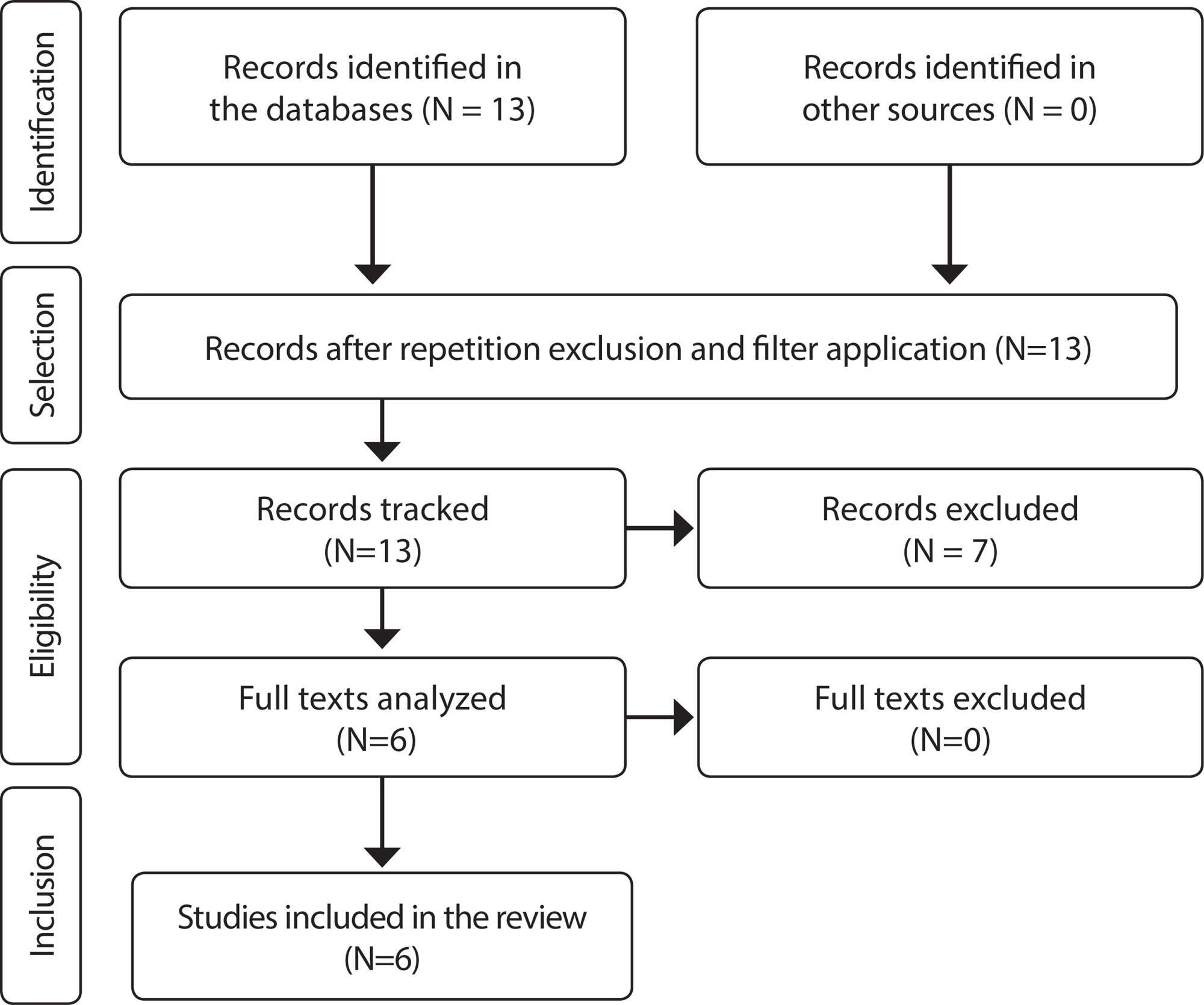
-
ORIGINAL ARTICLE03-24-2021
Development, validation and application of clinical simulation scenarios for assessment of stomatherapy specialists
Revista Brasileira de Enfermagem. 2021;74(1):e20200360
Abstract
ORIGINAL ARTICLEDevelopment, validation and application of clinical simulation scenarios for assessment of stomatherapy specialists
Revista Brasileira de Enfermagem. 2021;74(1):e20200360
DOI 10.1590/0034-7167-2020-0360
Views0See moreABSTRACT
Objectives:
to build and validate three clinical simulation scenarios and report the application with candidates for the specialist’s degree in stomatherapy.
Methods:
methodological study, building three scenarios and evaluation checklists; content validation with judges, using content validity index and Modified Kappa Coefficient; pre-test and application.
Results:
scenarios built based on nursing care for: 1. insufficiency and venous ulcer; 2. demarcation of intestinal stomia; and 3. Clean intermittent catheterization. In the content validation of the 24 items appreciated, 83%, 80%, and 92% were validated without change. In the pre-test, the objectives and checklists were adjusted. In the application, to standardize the evaluation, actors and evaluators were trained previously, and each candidate passed the three stations.
Conclusions:
scenarios built and with validated content, based on evidence and covering the three areas of stomatherapy. The pre-test allowed for adjustments in the scenarios, and the candidates achieved the expected objectives.
-
ORIGINAL ARTICLE07-15-2020
Cultural adaptation of Infant Feeding Intentions Scale (IFI) for pregnant women in Brazil
Revista Brasileira de Enfermagem. 2020;73:e20190103
Abstract
ORIGINAL ARTICLECultural adaptation of Infant Feeding Intentions Scale (IFI) for pregnant women in Brazil
Revista Brasileira de Enfermagem. 2020;73:e20190103
DOI 10.1590/0034-7167-2019-0103
Views0See moreABSTRACT
Objectives:
to translate and culturally adapt the Infant Feeding Intentions Scale for pregnant women in Brazil.
Methods:
methodological study that included stages of translation, synthesis, face and content validation, back translation and semantic assessment. In the face and content and semantic validation stages, we used the Content Validity Index for individual items and for the overall scale for clarity and representativeness.
Results:
nine (100.0%) experts participated in face and content validation, and the average index obtained was 85.0% for representativeness. In the semantic assessment, performed with 31 (100.0%) pregnant women, the tool was considered clear, obtaining an average index of 91.0%.
Conclusions:
the Brazilian version of the scale was considered representative and clear. After assessing psychometric properties, the scale is expected to be valid and reliable to assess maternal intention to breastfeed exclusively until the infant’s six months of life in different Brazilian settings.
-
ORIGINAL ARTICLE03-30-2020
Parental care for infants with feeding tube: psychosocial repercussions
Revista Brasileira de Enfermagem. 2020;73(2):e20180360
Abstract
ORIGINAL ARTICLEParental care for infants with feeding tube: psychosocial repercussions
Revista Brasileira de Enfermagem. 2020;73(2):e20180360
DOI 10.1590/0034-7167-2018-0360
Views0See moreABSTRACT
Objectives:
to understand the psychosocial repercussions experienced by caregiving parents, resulting from care for the child with dysphagic cleft lip and palate.
Methods:
qualitative study, developed in a tertiary hospital in September 2016. The sample defined by theoretical saturation consisted of seven mothers. Data collection was performed by unstructured interview, being audio-recorded and fully transcribed. Symbolic Interactionism was used as theoretical framework, and Thematic Content Analysis as methodological framework.
Results:
the following themes emerged: diagnosisimpact and coping; coping with overload and stress; interaction between caregivers as an acceptance and coping strategy; impact on family and social life of caregivers; and curiosity coping, and family and community prejudice.
Final considerations:
despite the physical and emotional overload, the mother figure plays the main and determining role in care, reflecting the complexity of care.
-
ORIGINAL ARTICLE03-30-2020
Stomized children care practices: narratives of relatives
Revista Brasileira de Enfermagem. 2020;73(2):e20180370
Abstract
ORIGINAL ARTICLEStomized children care practices: narratives of relatives
Revista Brasileira de Enfermagem. 2020;73(2):e20180370
DOI 10.1590/0034-7167-2018-0370
Views0See moreABSTRACT
Objectives:
to understand the practices adopted by relatives regarding ostomized children care.
Methods:
qualitative approach, conducted with 11 relatives of ostomized children. Methodological framework was used as narrative technique; NVivo® software for data categorization and information analysis; content analysis technique.
Results:
participants revealed unpreparedness in dealing with children, lack of knowledge about handling materials and equipment inherent to ostomy and challenges faced in the daily life of children in school. They are unanimous in telling they feel encouraged and strengthened by receiving support from nurses in child care. They suggested the development of strategies to guide ostomized children care, such as educational material use.
Conclusions:
to understand family members’ experience made it possible to support training and qualification of nursing professionals, and to establish priorities in care. Evidence found may contribute to reflections that aid health promotion and prevention of complications in ostomized children care.
-
ORIGINAL ARTICLE06-16-2021
Family interview for organ and tissue donation: good practice assumptions
Revista Brasileira de Enfermagem. 2021;74(2):e20190206
Abstract
ORIGINAL ARTICLEFamily interview for organ and tissue donation: good practice assumptions
Revista Brasileira de Enfermagem. 2021;74(2):e20190206
DOI 10.1590/0034-7167-2019-0206
Views0See moreABSTRACT
Objectives:
to identify information that can support creating good practice assumptions to develop family interview for organ and tissue donation.
Methods:
this scoping study, conducted in two Brazilian hospitals in the southern, between April and December 2017, included integrative review and consultation with 15 families who experienced interview for organ donation. For data analysis, thematic content analysis was used.
Results:
three categories emerged: communication of death, which shows the need to know the history of hospitalization of patients; emotional support, the team must have mastery of the stages of mourning; information about donation, professionals need to know the stages of the donation process and respect families’ time.
Final Considerations:
good practice assumptions point to the need for team training, respect for family time and the use of simple language.

-
ORIGINAL ARTICLE12-13-2019
Perception of women with breast cancer undergoing chemotherapy: a comprehensive analysis
Revista Brasileira de Enfermagem. 2019;72:103-110
Abstract
ORIGINAL ARTICLEPerception of women with breast cancer undergoing chemotherapy: a comprehensive analysis
Revista Brasileira de Enfermagem. 2019;72:103-110
DOI 10.1590/0034-7167-2018-0165
Views0See moreABSTRACT
Objective:
To comprehensively analyze the perception of women with breast cancer on the experience of undergoing chemotherapy.
Method:
This was a qualitative, descriptive, phenomenological study, supported by the Merleau-Ponty philosophy. It was conducted in a chemotherapy outpatient clinic with 20 participants who completed a phenomenological interview.
Results:
The phenomenological data analysis demonstrated that the perception of women about the experience of chemotherapy is about change, not only of the physical body, but of their identity, and that it considers existential aspects. Three categories emerged from the experience of alopecia, fatigue, and spirituality, respectively: the body itself, the current and habitual body, and transcendence.
Final considerations:
Bodily changes, and the existential implications perceived by the women in this study, analyzed from the Merleau-Ponty perspective, makes it possible to consider body concept, and provides support for humanized care based on singularity and the socio-cultural context.
-
REVIEW07-14-2021
Symptom management theory applied to nursing care: scoping review
Revista Brasileira de Enfermagem. 2021;74(3):e20201004
Abstract
REVIEWSymptom management theory applied to nursing care: scoping review
Revista Brasileira de Enfermagem. 2021;74(3):e20201004
DOI 10.1590/0034-7167-2020-1004
Views0See moreABSTRACT
Objectives:
to identify publications about the applicability of the Symptom Management Theory in nursing care to pediatric, adolescent, adult and elderly patients.
Methods:
scoping review following the steps: definition of the objective, research question and inclusion criteria; search, selection and analysis of publications; synthesis of results. The search occurred in the VHL, SciELO, CAPES and PubMed Journals Portal bases, contemplating publications between 1994 and July 2020.
Results:
out of 3,286 studies, ten were selected, published between 2008 and 2019. They described the relationships between the participants and the domains (person, environment, health and disease), components (symptom experience, management strategies, results) and presented strategies for symptom management.
Conclusions:
the Symptom Management Theory was considered applicable to the participants of the studies and to nursing care. It was concluded that understanding the interaction of these elements is essential to plan actions aimed at controlling symptoms effectively.
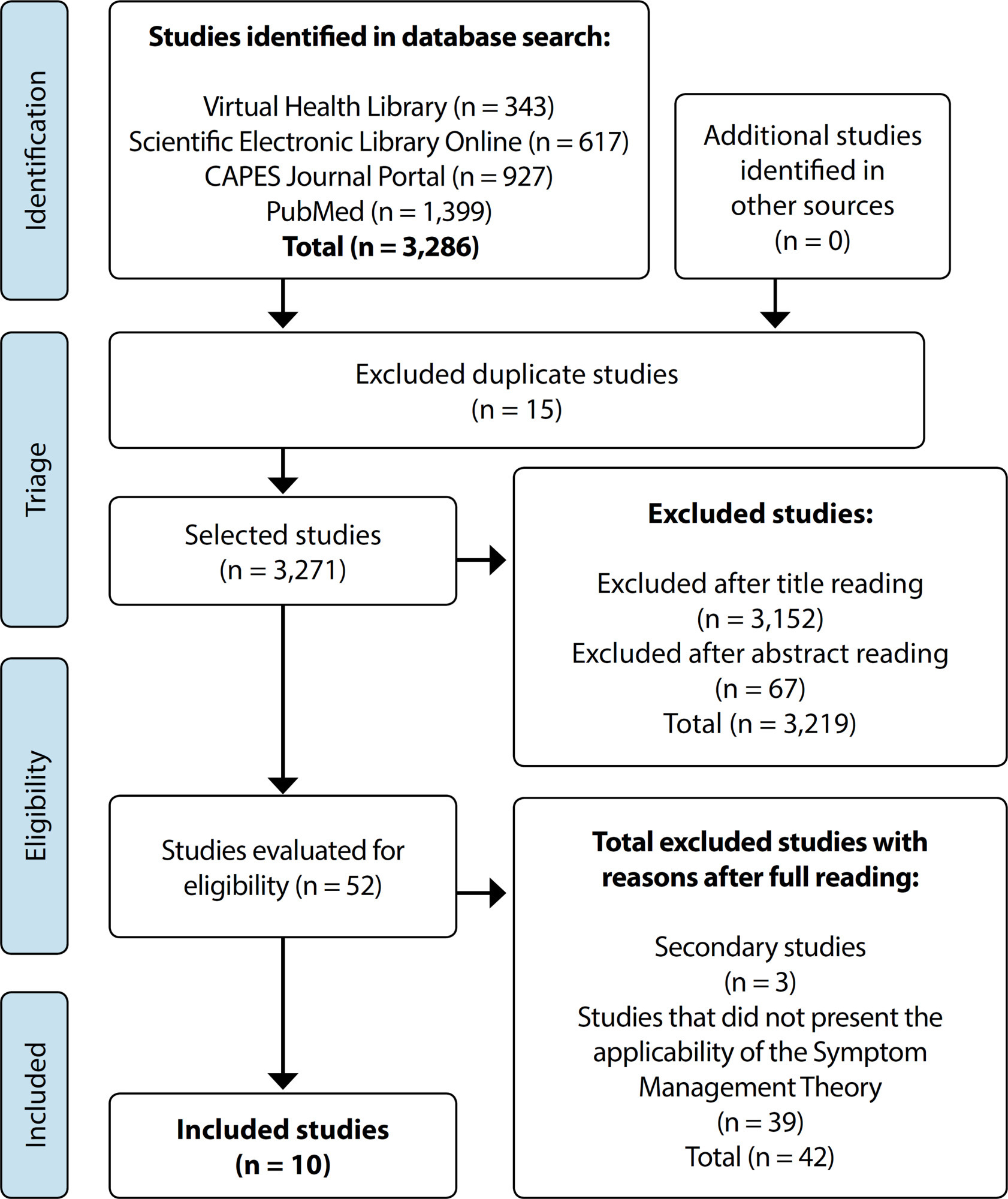
Search
Search in:
Nuvem de Tags
Adolescente (85) Atenção Primária à Saúde (239) COVID-19 (91) Criança (91) Cuidados de Enfermagem (269) Educação em Enfermagem (151) Educação em Saúde (139) Enfermagem (930) Enfermagem Pediátrica (86) Estudantes de Enfermagem (77) Estudos de Validação (131) Família (87) Idoso (208) Promoção da Saúde (99) Qualidade de Vida (104) Saúde do Trabalhador (86) Saúde Mental (145) Saúde Pública (82) Segurança do Paciente (150) Tecnologia Educacional (100)



